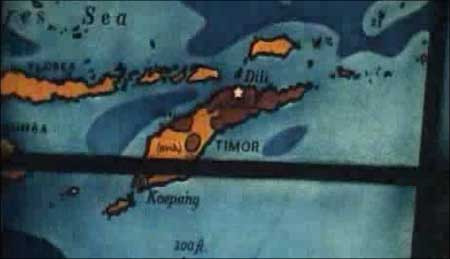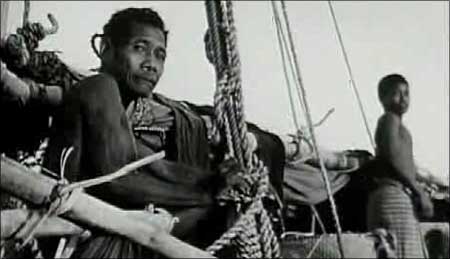I first heard of East Timor by watching "Manufacturing Consent", a documentary on Noam Chomsky. In this film Chomsky calls East Timor the great untold war story of the 20th century. He states that the atrocities committed by foreign nations in East Timor are comparable to Pol Pot in Cambodia. And he notes that, in contrast to Pol Pot, nobody seemed to notice.
(The film, btw, I now consider mandatory viewing for every member of a society that has TV, newspapers, and/or corporations. Much time is spent on Chomsky's view of how public opinion is shaped by political and commercial processes. It's great introductory material to the Modern State of Truth. School children should watch it. If you're a teacher: bring it in the classroom, please. See below for download links.)
 |
The island Timor, sitting somewhere between Indonesia and Australia (Google Maps, Google Earth). East Timor is the darker part of the island, with the capital Dili marked by a white star. The lighter, western part of the island is now part of Indonesia. |
An Attempt to Recapitulate
To me the story seems to go like this (please send in corrections):
Southeast Asian island Timor has been occupied by Western governments for centuries. According to the Chomsky documentary, Timor hosted one of the last surviving ancient civilisations in that part of the world, living a self-sustained life mostly secluded from modern societies.
 |
The area around Timor is also known for its oil reserves. In the 1970ies Brits find major new oil reserves, in 1975 Indonesia starts a war under political pretenses, and things take a really wrong turn. US President Ford assures he would refrain from intervening. Even Australia starts salivating. It is blatantly obvious that the war is fueled by skewed politics and corporate greed, but the world doesn't seem to care. Timor is occupied, thousands die.
In 2002, after 30 years of struggle, East Timor regains political independence. A government is instated in a manner that seems a little opaque regarding the involvement of former occupants. The country's new military is a wild mixture of former resistance militia and pro-Indonesian soldiers. The country is slowly recovering from a state of shock, from a feeling of betrayal, but oil interests are still not cleared.
A couple of years later, in early 2006, things fall apart again. The former occupants feel like they should "help out" and clean the new mess, not admitting in public that the situation is a direct result of their previous actions.
And this is where we are right now. A big political mess, and a society on the verge of civil war.
Hm. Where have I heard this story before?
Watch, Listen, Think, then Write
This may sound like a Unicef commercial to you. It's a very simplistic summary, and I've deliberately chosen to be partisan in my descriptions. And the cute indigene on a boat as pictured above borders on cheap emotional manipulation.
But I was quite touched by the story. It's not that simple to get me interested in contemporary politics (I tuned out of local news years ago), but there are things that I really care about. I think Timor is a great example of the Modern Tale, of the power of deception in the hands of a selected circle. Of nepotism at the highest levels.
A new situation is unfolding right now in Timor, but although the media are a little more interested than 10-20 years ago it's still hard to find out what is actually happening. Compared to a decade ago the informal news circles are working quite well, but there are a lot of opposing positions and inconsistencies.
The Wikipedia talk pages of the relevant articles can serve as nice illustrations of the general confusion, of misinformation, and skewed sources. Cf. "East Timor talk page ", "2006 East Timor crisis talk page".
An analysis on Global Voices attempts to clear up some misinformation and demonstrates that there still are people who are trying to see through the mud -- but notice that all of the cited sources are translated from Portuguese.
That's what Chomsky is talking about in his commentary on modern media: It's hard work to stay informed. You need to be educated, you need allies you can trust. You need to watch many, many sources, and then compare. It's a fucking maze.
And on the other side it's hard to get a message across that disagrees with the common consensus. Nobody listens anymore when your argument takes more than 20 seconds.
Recommended Reading
- Wikipedia: 2006 East Timor crisis
- TailRank search: "Timor" (feed). Probably the best persistent news resource, covers a wide spectrum of sources.
- tumbleweed in timor lorosae, private blog of a Unicef volunteer
Mandatory Movie Download
- MiniNova search: "Manufacturing Consent"
- PirateBay search: "Manufacturing Consent"
- The film is also available on ChomskyTorrents.org, but you can't link to search results. Otherwise this link would work: "Manufacturing Consent"
Comments
Comments are closed. You can contact me instead.